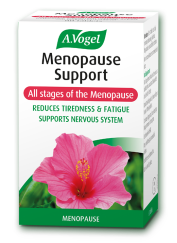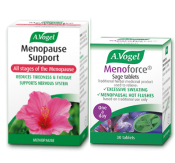Today's topic
Today on A.Vogel Talks Menopause, I'm going to be telling you about seven fatty foods that you should be eating in the menopause.
For those of you who were watching last week, you would have heard me talk about why snacks are so important and why having fat in your diet is also really important as well. So I thought this week I would go into the fats in a little bit more detail.
It's such a confusing subject, but hopefully I will give you a better idea of what you should be aiming for and what you should be avoiding.
What is good fat and bad fat?

Now, there are what's called good and bad fats. Bad fats are a lot of saturated fats from things like your red meats, cheeses and dairy products. You've got trans-fats, and you've got hydrogenated fats which are more of the man-made fats like margarines. We've got good fats which are unsaturated fats, monounsaturated fats and polyunsaturated fats so it's easy to get confused about this.
Why good fats are important during menopause
But why are good fats really important for you in the menopause? There are a number of reasons.
Your brain function
You need fat for brain function, so all of you out there that are getting the foggy brain and the forgetfulness, some of it might be due just to having a bit of a low-fat diet.
Your joints
You need fats to keep your joints lubricated. It's like putting oil in your car. It's keeping all the mechanisms going, so fats are really important for good joint health.
Your good skin
You need it for your skin. Our skin changes such a lot during the menopause and having good healthy fats can keep your skin glowing.
Your weight control
Believe it or not, good fats will help to control your weight, so this is a really good one to remember.
Your hormone production
In the peri-menopause and the menopause, you're at the point where you need all the hormones you can get. And we need to have a certain amount of fat in our diet in other to produce hormones.
What I have found really interesting, looking at lots of research over the last few years, is that for those of you who are going through the peri-menopause and the menopause just now, you are the ladies who have been brought up being told that fat is bad, fat is the enemy. So a lot of you are reaching the peri-menopause and the menopause having had a low-fat diet practically your whole life, and this is now possibly impacting on your hormonal health as you go through the menopause.
How much fat should we have each day?
So how much fat do you need? I thought I would check the internet and it was the most frustrating hour of my life. Practically every single website had different figures on it, and I'm just thinking, "How do we know what's correct when there's all this different information out there?"
So what I thought I would do is ask Emma, our own nutritionist, what her take on good fats and how much you should have in your diet.
This is what she told me. The Dietary Reference Intake which is the DRI for fats in adults, is between 20 and 30 percent of your total daily calorie intake. So that's approximately 45 to 75 grams per day for the average female who's on a 2,000 calories a day diet.
She said that personally, she would recommend aiming for the upper end of the scale, as generally, a lower fat content of food means more carbs and sugar instead.
Now, there are only three main macronutrient food groups, so that's your fats, your carbohydrates, and your protein. And we're less likely to add in a good quality protein to make up for the low-fat options, so all these packaged foods that a lot of people are eating that are labelled low fat tend to be much higher in sugar. These are not really good foods to be adding into your diet.
She also says don't get too hung up on the figure, don't get paranoid about how much fat you're eating or not eating in your diet. Fats are satiating so that means that they will fill you up quicker.
They will help you to decrease your appetite, so if we practice good eating habits, such as eating slower, we should find that we will feel satisfied sooner rather than later which means that we'll eat less, and this is one of the reasons why good fats can help with weight control.
The 7 fatty foods you should be eating
So what are the seven fatty foods that you should be aiming for in your diet?
1. Eggs
The first one is eggs. Eggs are great. They are a whole protein. They provide fats, vitamins, and minerals as well, so they are really super food. I aim for about four or five a week, sometimes as part of a main meal and sometimes just as a good snack.
There was also a study done showing that people who had introduced eggs for their breakfast instead of these high-sugar breakfast cereals, ate less calories during the day just because they had a good protein breakfast, so that's something to bear in mind as well. Eggs also contain lecithin and lecithin helps to emulsify fats, so this is a great addition to your weekly diet.
2. Fatty fish (or tofu if vegan)
We're looking at fatty fish. That's eating your salmon, your sardines, your mackerel, maybe two to three times a week. Tinned tuna doesn't count because they take all the fish oils out the tuna and either replaces them with sunflower oil, or water.
So if you want to have tuna as a fatty fish in your diet, then it needs to really be the fresh. For those of you who are vegetarian or vegan, you could replace the fatty fish with foods like tofu as quite a nice swap.
3. Oils
You need your good fats, that would be things like your coconut oil. I know this is a saturated fat, but research seems to show that coconut oil is a good one, so it can really help to be part of a healthy diet.
And you've got things like your extra virgin olive oil as well, so these should be added into your daily diet.
4. Nuts
Nuts are great. They're full of protein, they're full of fat, they've got fibre in them and, they've got magnesium in them. They're a super-duper food and great for snacks as well. If you're not too keen on chomping whole nuts, then you've got these lovely nut butters.
Just watch that they're organic and that they're not adding sugar in them as well. Some peanut butters I know have things like palm oil in them which is really not good, plus they also have sugar in them, so just read the label before you buy the nut butters.
5. Dark chocolate
Number five is dark chocolate. I can hear everybody going, "Hooray." Please don't overeat this one. Now, this is one of the ones I tend not to eat because unfortunately, my willpower will not last for one square. One square of dark chocolate (and it needs to be about 70% at least cocoa content for this to be of any real benefit), contains about 60 calories, so this is just one of the nice fats that you want to have as a special treat rather than something to have on a regular basis.
However, if you're one of those people that have a high-fat, carbohydratey puddings every day, then swapping a pudding for a little piece of chocolate would probably save you quite a few calories on a daily basis.
6. Full-fat yoghurt
Look at things like your full-fat yoghurt. I love Greek yoghurt. It's a great snack. It's great to have on fruit as well and just a small portion is quite low in calories too, as long as you don't overdo it.
Just make sure that if you're buying full-fat yoghurts they don't have fruit or sugar in them as well.
You know, it's one of these things, always read the label of things that you're buying because sometimes you can be really surprised at what's in there that really shouldn't be in there.
7. Seeds
You can look at seeds, these are another super fat. So you've got your chia seeds, sunflower seeds, sesame seeds, flax seeds. These mixes you can get are great. The only thing I would say here is that when you start to grind up seeds, the fats in them go rancid really quickly, so you're better to buy all the seeds whole and then, if you've got one of those little coffee grinders, just to grind everything up when you need it, rather than opening packets and keeping them in the fridge.
My favourite high fat food
I incorporate all the ones that I've just spoken about on a weekly basis, apart from the chocolates. I prefer avocado; small pieces of avocado on a regular basis is absolutely fabulous. I love olives as well; they are quite high in calories, so I'll maybe put three or four olives in the salad just to help that along.
High fat foods to avoid
It's your processed foods; I really would avoid margarines as well because they tend to have the hydrogenated fats in them. Junk foods, any kind of fried foods, and things like chips and crisps. All the things we tend to love, unfortunately, are the ones that can be really, really bad for us, so try and keep these foods out of your weekly diet, if you can.
What to be aware of if you have high cholesterol
Just one piece of advice here; if you are under medical guidance for high cholesterol, if you are on any cholesterol-lowering medication, then it's really important that you speak to your doctor before you start changing your diet. Try and get some proper advice here as well.
Consider consulting a nutritional therapist
If any of you are still confused, I would recommend going to see a practitioner called a nutritional therapist. They can give you really good advice on the types of good fats that you should be putting into your daily diet.
Hope that has given you a little bit of a clue, just realising that not all fats are the enemy and some of them can really help you going through the menopause. So I look forward to seeing you next week on another edition of A.Vogel Talks Menopause.









